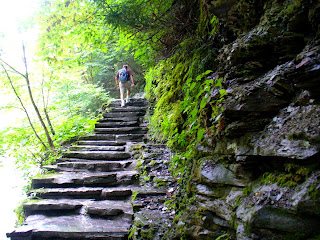Four days in New York Finger Lakes Region
Hiking
Only four hours from our home in Ontario, the idea of hiking
three of the most beautiful state parks in New York was a definite destination
for us.
We booked a hotel in Hornell, which was central for all of
the planned activities.


 The 577 acres of Stony Brook State Park have an interesting history. Seneca Indians hunted and fished here long before the Europeans arrived over 150 years ago. In 1883, the construction of a railroad encouraged visitors to Stony Brook. In 1920 the park fell into disrepair but was established as a state park and during the 30’s was quickly revived as a Federal public works project.
The 577 acres of Stony Brook State Park have an interesting history. Seneca Indians hunted and fished here long before the Europeans arrived over 150 years ago. In 1883, the construction of a railroad encouraged visitors to Stony Brook. In 1920 the park fell into disrepair but was established as a state park and during the 30’s was quickly revived as a Federal public works project.
The Gorge Trail meets the West Rim Trail just
before the parking lot in the Upper park area.
The park offers camping, picnicking and has a great natural swimming
pool.
Day two, we awoke to clouds and scattered showers so we
decided to head to Watkins Glen State Park. It was about an hour’s drive from
our hotel and luckily, the rain stopped before we arrived at the park.
Watkins Glen is a spectacular narrow gorge where you can
hike alongside Glen Creek past deep pools, water sculptured rocks and nineteen
waterfalls. During the past million years, water in the form of giant mounds of
ice, or glaciers transformed the landscape. The park has been opened since
1906.
We passed through the tunnel entrance and began our ascent
on the Gorge Trail. Visitors should be reminded that there is a shuttle bus
available for those that find the climb too challenging and an easier hike down
the gorge from the top can be achieved without much difficulty. We hiked up the
gorge, past Sentry Bridge and on to Cavern Waterfall which you actually walk
behind the falls on your climb. Pictures can never show the true beauty but perhaps they will tempt you to go and see these parks for yourself.
At Suspension Bridge you can access Lily Pond, the South pavilion and the swimming pool, or you can do as we did and continue on the Gorge trail under the suspension bridge. Next comes the Narrows where the gorge has it’s own microclimate similar to the rainforest. At the top of the next staircase is Glen Cathedral and it is an extraordinary sight. Drought resistant grasses, wildflowers and shrubs grow on the ledges.
At Suspension Bridge you can access Lily Pond, the South pavilion and the swimming pool, or you can do as we did and continue on the Gorge trail under the suspension bridge. Next comes the Narrows where the gorge has it’s own microclimate similar to the rainforest. At the top of the next staircase is Glen Cathedral and it is an extraordinary sight. Drought resistant grasses, wildflowers and shrubs grow on the ledges.
Central Cascade and Glen of Pools feature the highest
waterfall, at more than 60 feet. Rainbow Falls allows another opportunity to
walk under the falls. Beyond the bridge, enter a dark and narrow passage with
dripping springs, ancient sculptured pools and Pluto Falls. At the top of the
trail there are restrooms and a snack bar. We continued down the Indian Trail
for a forest hike back to the entrance.
Day three, and the weather is beautiful. Now we travel about
forty minutes north to Letchworth State Park, a 14,350 acre park along the
Genesee River. Precipitous walls of the Gorge with the river winding below,
dramatic waterfalls and the beauty of the surrounding forest make this park an
excellent hiking experience.
Known as the “Grand Canyon of the East” the park’s story began when Mr. William Pryor Letchworth first purchased the building and surrounding one hundred acres in 1859. Over the next fifty years, Mr. Letchworth developed Glen Iris Inn and the surrounding grounds into the spectacular location that it is now. The property was deeded to the state of New York in 1907. On the ridge behind the Inn stands a restored Seneca Council House and a statue of Mary Jemison. The park offers camping, picnicking and a Trout pond for fishing. The Inn and museum are definitely worth a visit.
Known as the “Grand Canyon of the East” the park’s story began when Mr. William Pryor Letchworth first purchased the building and surrounding one hundred acres in 1859. Over the next fifty years, Mr. Letchworth developed Glen Iris Inn and the surrounding grounds into the spectacular location that it is now. The property was deeded to the state of New York in 1907. On the ridge behind the Inn stands a restored Seneca Council House and a statue of Mary Jemison. The park offers camping, picnicking and a Trout pond for fishing. The Inn and museum are definitely worth a visit.
We took the seven mile Gorge Trail in order to enjoy all of
the Upper, Middle and Lower Fall areas.
The day passed quickly as we hiked along the beautiful gorge
and through the lovely forest.
Tired but pleased with ourselves, we returned to the hotel
to pack for home.















